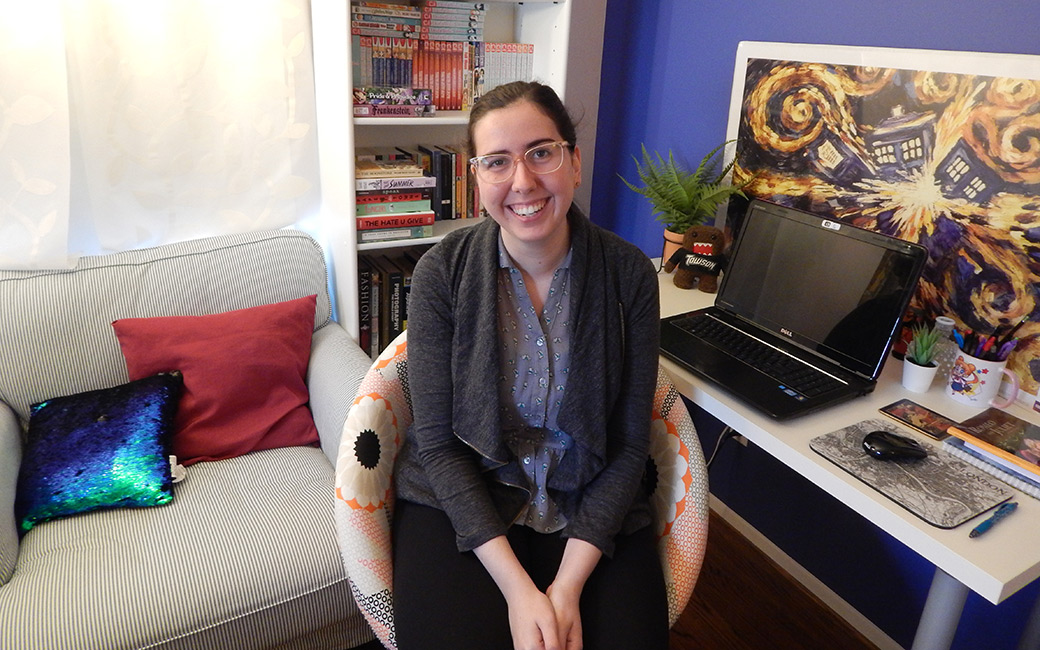TU interns adapt quickly to teaching from a distance
As closures interrupted hundreds of professional internships at Maryland schools, TU students jumped into action to reach their students virtually
By Rebecca Kirkman on May 8, 2020

When Kaitlynn Gooding ’18, ’20 walked through the halls of Sykesville Middle School on Friday, March 13, they were buzzing with chatter. The day prior, families learned that students wouldn’t be returning the next week for in-person classes due to the novel coronavirus. As students cleaned out their lockers, it “felt like the last day of school,” Gooding recalls, though that day was more than three months in the future.
Completing her Master of Arts in teaching (MAT) from Towson University this month, Gooding has been teaching English language arts since January as part of her full-time spring internship.
On the final day of in-person classes, she faced a room of excited students looking to her for direction and the daunting task of preparing for the rest of the school year—without a clear picture of the challenges ahead.
“This is one of those situations where you’re going through something in the real world that school could have never completely prepared you for,” Gooding says. But unlike other educators in the field, Gooding has the support of her mentor teacher, TU faculty and MAT cohort. Nearly a month into teaching via Google Classrooms, Gooding has embraced the unprecedented situation as a learning opportunity.
What has she gained from the experience so far? “For one, adaptability,” Gooding says. “We’re figuring out how to design instruction, implement it and work with all these digital tools while still trying to build connections with students.”
Gooding was one of more than 700 TU College of Education students placed in internships at public schools throughout Maryland when they were ordered to close by State Superintendent of Schools Karen Salmon.
As the COVID-19 pandemic and the move to distance learning disrupted the school year like never before, TU students have used their skills to jump into action. More than 400 full-time interns continue to teach virtually.
“Our students decided to take this opportunity and run with it,” says Roger Plunkett, the MAT supervisor for Carroll and Howard counties. “This pandemic gave them an opportunity to be true 21st-century educators.”
Plunkett says the use of instructional technology in distance learning will be critical in differentiating instruction, assessing students and ensuring that instruction is meaningful and engaging. “They are jumping into virtual teaching, and education is never going to be the same after this.”
“Our interns have been working side-by-side with their mentor teachers who are also transitioning instruction into online and distance learning,” says College of Education Dean Laurie Mullen.
“This will be a great opportunity for our students to learn the process of how you transition a classroom from traditionally being taught into online instruction. So for all the interns out there, keep up the good work—we are very proud of you.”
Emily Witt ’17, ’20, an intern at Patuxent Valley Middle School, will also complete the MAT program this spring. In mid-April, she was working with her mentor teacher to adapt their eighth grade English Love and Friendship unit, covering Shakespeare’s Romeo and Juliet, to distance learning using platforms including Canvas and Google Meet.
“This is so new to all of us,” she says. “We’re all trying to troubleshoot it together as a community, like how to implement the digital education and different platforms we can use to teach the students virtually.”
Witt sees it as an opportunity to build upon the digital teaching skills she has already learned. “The Towson program emphasized integrating digital instructional technology, and as an English teacher, sometimes it would be hard to find ways to integrate that technology,” she says. “So this gives me a lot of practice with that.”
In the end, Witt and Gooding say the experience will prepare them to be ready for anything. “There are a lot of new opportunities we can take from this,” Gooding says. “I think it’s really good to use this situation as a pilot because we never know when this is going to happen again or how long this is going to last.”
This story is one of several related to President Kim Schatzel’s priorities for Towson University: TU Matters to Maryland.